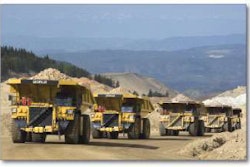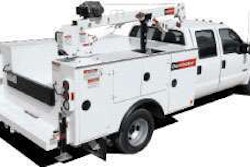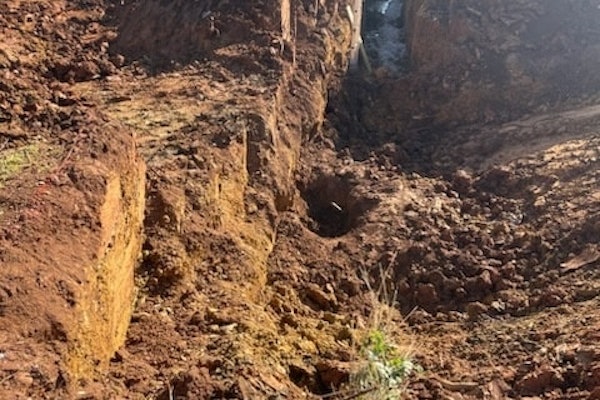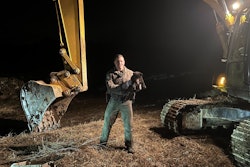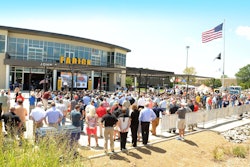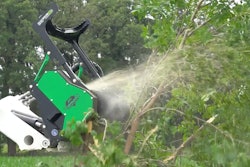G.C. Campbell and Greg Goodman
Mooresville, North Carolina
When two friends joined forces, they took a second- generation pipeline firm to the next level.
By Tom Jackson
G. Campbell Construction
Year started: 1993
Number of employees: 50 +
Annual volume: $5 to $7 million
Markets served: Natural gas pipeline installation – distribution and transmission, horizontal directional drilling, pipeline station construction, integrity pipeline work, road boring and creek and river crossings.
In the early 1960’s Grady Campbell got out of the Marines and started working in construction. His son G.C. rode along with him on jobs as early as age seven, and by the time he was 15, G.C. was working with his dad in the summer and every school break.
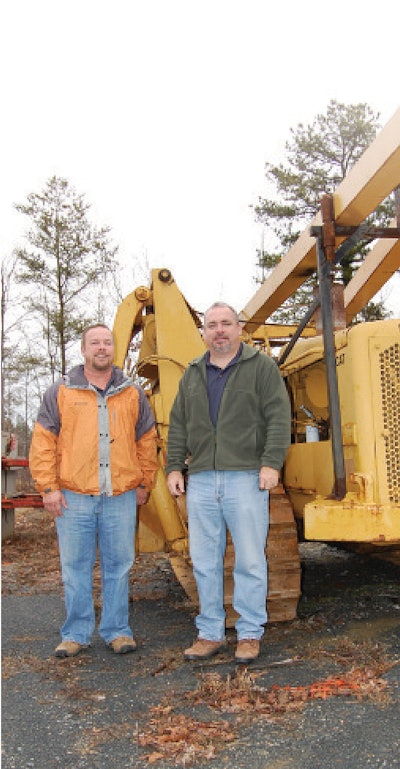 G.C. Campbell (left) and Greg Goodman
G.C. Campbell (left) and Greg GoodmanThen in 1993, Grady started his own company along with his son, primarily doing gas pipeline work. The father-son team happened to hit it at a very good time as the Charlotte, North Carolina, region was just beginning to boom.
Today the company has expanded and diversified its offerings to include everything from running a gas line to houses to mainline transmission lines, regulator stations, integrity work, irrigation and water lines and anything in between. It also performs horizontal directional drilling and can do driveway shots or 1,000-foot bores through dirt or hard rock, and creek and river crossings.
Delegate and grow
About three and a half years ago, his dad retired completely and G.C. found himself overwhelmed with the details of running the company by himself. “I’d lay in bed at night thinking about all the things that didn’t get done that day,” G.C. says.
As chance would have it, G.C. had a friend from childhood, Greg Goodman, who was a partner in the business and ran a crew in the field. When G.C. offered him the job of business manager, he was eager to make the switch. Greg had been looking for a bigger challenge and thinking along the same lines himself.
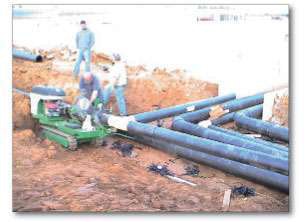 The complexities of gas pipeline work require highly skilled operators and rigorous safety standards.
The complexities of gas pipeline work require highly skilled operators and rigorous safety standards.“The way G.C. put it to me was there needed to be more than one person who knew how to do what he knew how to do,” Greg says. And that meant being able to talk to the major clients like the big gas companies on a professional level, overseeing the back end of the business such as payroll, job costing and bid work and the basic day-to-day logistics.
Having 10 years in the field, Greg had mastered the technical requirements of the job. The new managerial responsibilities were a different challenge. “It’s a different kind of stress and a different set of responsibilities,” he says. “I realized quickly that I had to think more about the big picture. You have to make sure the company is making money. You try to keep everybody working when times are tough. You think about the responsibilities you have to the families of the people who work for you.”
“Bringing on Greg made perfect sense,” G.C. says. “As part owner he was going to be more involved than somebody who didn’t have a stake in the overall business.” He also had good relationships with everybody in the company from the laborers on up. “They all knew him and that made the transition easier than bringing in somebody from the outside,” G.C. says.
Safety first
All the regional gas companies require a high level of skill from operators and top notch safety programs. Foremen and operators are certified according to the federal pipeline regulations and operators have to pass a written test and be qualified on an excavator simulator before they’re allowed to work on a gas company project. The gas companies also require re-qualifications every few years just to make sure everybody stays sharp.
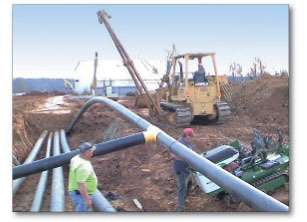 Gas pipeline work has been a mainstay of the company’s business since the beginning.
Gas pipeline work has been a mainstay of the company’s business since the beginning.Drug and alcohol pre-screening is used for all job applicants, and random drug and alcohol testing is also used for established employees. The company is a member of the National Safety Council and the North Carolina Safety Council, and is involved with the state One-Call association.
G.C. believes in accountability for all his employees. They have bi-weekly safety meetings for the crews and a safety reminder goes out in each paycheck twice a month. Training and operator qualifications are spelled out in the employee handbook. If something is done wrong the employee is given a verbal warning. And it rarely goes beyond that. “We don’t have to do that very often,” G.C. says. “We want everybody to go home at night.”
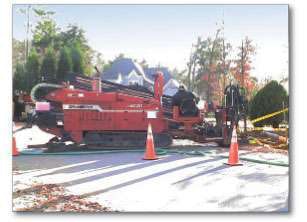 G. Campbell Construction diversified into HDD operations and can handle everything from driveway shots to river crossings.
G. Campbell Construction diversified into HDD operations and can handle everything from driveway shots to river crossings.G.C. and Greg also frequent the jobsites to make sure the operators and supervisors are following the letter of the law. “I don’t want anybody to do anything I wouldn’t do myself,” G.C. says. One of the results of this integration of safety and operations is an experience mod rate around 0.85. “Our insurance company is extremely pleased and it really helps us when it’s renewal time,” G.C. says.
Finding and keeping operators
Operators with good machine skills, accountability and the presence of mind to work safely day in and day out on these jobsites aren’t easy to come by, G.C. says. When they put ads in the paper they often wind up interviewing people who aren’t qualified. The job entails a lot more than just running a machine. So when he is evaluating potential employees, experience isn’t the most important attribute, G.C. says. If he finds somebody with a good work ethic, he’ll take the time to train them.
Once they do get a good operator, they strive to provide him with a family atmosphere and as a result have had a fairly stable crew of 50 to 60 employees over the last few years. “Keeping people happy is a big part of my job,” G.C. says. “I have to listen to my guys, and sometimes help them resolve issues. But I’ve known some of these guys for years and I know their kids. People aren’t just numbers to us. I care about these guys. And if I can help them get their issues resolved, they’re going to be better employees for it.”
Customer satisfaction
G.C.’s and Greg’s long experience in underground construction and ability to field highly experienced crews has won them plaudits from customers.
“We used to have to call contractors from all the way down in Texas, but G. Campbell does it all for us now,” says Seth Rogers, operations superintendent, Lancaster County Natural Gas. “They have good guys working for them. They do perfect cleanups and they don’t have equipment downtime. They’re a real good group compared to the other ones I’ve had.”
“I’m very pleased with their work, and we’re very selective about who we allow to work with us,” says Terry Adams, York County Natural Gas. “ We’re really impressed with their foreman in South Carolina, Mike Yarborough. He’s been fantastic on the more challenging jobs and tremendous on safety. Several times he’s helped us catch things that could have been a problem.”
“I’ve been fortunate to have done business with them for the last 15 years,” says Dino Beck, who has sold the company numerous directional drilling machines, piercing tools and other specialized underground machines. “You can still shake their hand and consider it their bond. I consider him a good friend as well as a good customer. He’s been blessed to have most of the same crew leaders for the last 8 to 10 years and he can run any piece of equipment on the job. He knows what’s going on and nobody pulls the wool over his eyes.”
Surviving the recession
The split management role created when G.C. brought Greg into the business side of the company has served them well in the current recession. “In the 90s and early 2000s it was all about how much we can get done,” Greg says. “Today its more about how well we managing what we’ve doing. We’ve had to make some tough choices and scale back some of our long range planning as far as equipment goes. And it’s hard to think about expanding, but things look better now than they did last year.”
G.C. adds that they got lucky with a major job from a big customer, but luck more often than not, favors those who are prepared. “You have to be involved in every aspect of the company,” he says. “You can’t just put people out there and not keep up with them. You have to be involved completely.”




